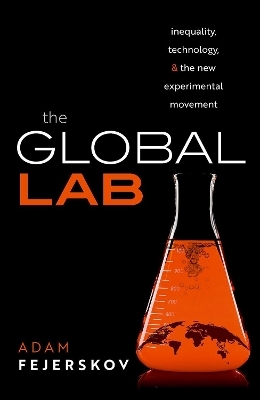
The Global Lab
Inequality, Technology, and the Experimental Movement
Seiten
2022
Oxford University Press (Verlag)
978-0-19-887027-2 (ISBN)
Oxford University Press (Verlag)
978-0-19-887027-2 (ISBN)
The Global Lab examines how new technologies affect people across the world, opening up new opportunities but also exacerbating inequalities in society.
The Global Lab tells the story of a group of organizations and corporations using low-income countries as a laboratory. It reveals experiments with untested technologies, biometric humanitarian solutions, and radical methodologies for social change. The book maps out the political, institutional, and ethical coordinates of emergent transnational practices of experimentation, asking where and how this movement works, while unfolding the human, philosophical, and political consequences of its ideas and interventions.
The book takes the reader through Silicon Valley, Africa, and Asia to understand the tangible and transformative implications of contemporary human experimentation. It follows a set of main protagonists, from the Bill and Melinda Gates Foundation to experimental economists known as the randomistas, to humanitarian organizations and pharmaceutical companies. These actors form a movement inspired by the logic of Silicon Valley about the need for fast-paced radical change and societal disruption, technological innovation as progress, and the privatization and commercialization of the human mind and body. Ultimately, the book examines the inequality of experimentation that is found in the erection of walls between us and them, and the imagined universal and often unquestioned value of scientific and technological progress.
The Global Lab tells the story of a group of organizations and corporations using low-income countries as a laboratory. It reveals experiments with untested technologies, biometric humanitarian solutions, and radical methodologies for social change. The book maps out the political, institutional, and ethical coordinates of emergent transnational practices of experimentation, asking where and how this movement works, while unfolding the human, philosophical, and political consequences of its ideas and interventions.
The book takes the reader through Silicon Valley, Africa, and Asia to understand the tangible and transformative implications of contemporary human experimentation. It follows a set of main protagonists, from the Bill and Melinda Gates Foundation to experimental economists known as the randomistas, to humanitarian organizations and pharmaceutical companies. These actors form a movement inspired by the logic of Silicon Valley about the need for fast-paced radical change and societal disruption, technological innovation as progress, and the privatization and commercialization of the human mind and body. Ultimately, the book examines the inequality of experimentation that is found in the erection of walls between us and them, and the imagined universal and often unquestioned value of scientific and technological progress.
Adam Fejerskov is Senior Researcher at the Danish Institute for International Studies. He studies the terrains and ramifications of contemporary global inequalities, examining how these flow from and are manifested in a diverse cast of issues, from emerging technology, science and knowledges to humanitarianism and aspirations of global development.
Preface
1: The Global Lab
2: Humanitarian Machine Dreams
3: The Randomistas
4: The Gates Effect
5: Experimental Bodies
6: The Silicon Valley Way
7: Experimental Futures
| Erscheinungsdatum | 01.07.2022 |
|---|---|
| Verlagsort | Oxford |
| Sprache | englisch |
| Maße | 160 x 240 mm |
| Gewicht | 470 g |
| Themenwelt | Sozialwissenschaften ► Soziologie ► Spezielle Soziologien |
| Wirtschaft ► Volkswirtschaftslehre | |
| ISBN-10 | 0-19-887027-2 / 0198870272 |
| ISBN-13 | 978-0-19-887027-2 / 9780198870272 |
| Zustand | Neuware |
| Haben Sie eine Frage zum Produkt? |
Mehr entdecken
aus dem Bereich
aus dem Bereich
eine Einführung
Buch | Softcover (2024)
De Gruyter Oldenbourg (Verlag)
CHF 41,90


